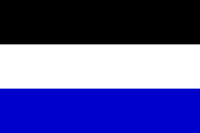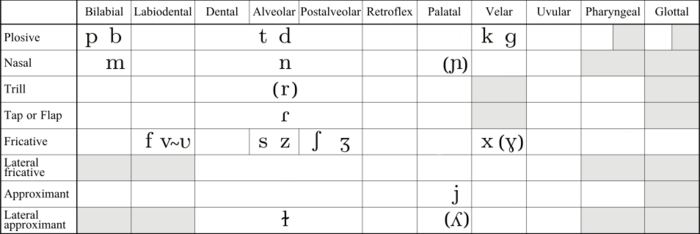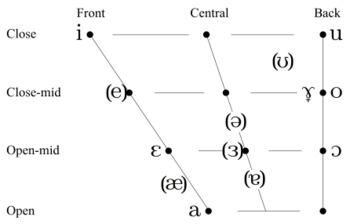Karaalani language: Difference between revisions
Admiral S.S. (talk | contribs) |
Admiral S.S. (talk | contribs) No edit summary |
||
| Line 341: | Line 341: | ||
[[File:Karaalani consonants.png|700px|left]] | [[File:Karaalani consonants.png|700px|left]] | ||
[[File:Karaalani vowels.png|350px|cenre]] | [[File:Karaalani vowels.png|350px|cenre]] | ||
=Nouns= | |||
==Grammatical Gender== | |||
Karaalani has 3 [https://en.wikipedia.org/wiki/Grammatical_gender grammatical genders] | |||
*'''Masculine''' - all masculine nouns end in a consonant sound | |||
*'''Feminine''' - all feminine nouns end in /a/ | |||
*'''Neuter''' - all neuter nouns end in /o/ or /ɛ/ | |||
==Definiteness & Plurality== | |||
Definiteness and Plurality in Karaalan are direclt effecte by the grammatical gender of a noun | |||
<small>(Note: when a word's last consonant is ''k'' the plural replaces it with ''č'', and if is ''t'' it becomes ''c/ts'')</small> | |||
{| class="wikitable sortable" | |||
! Word | |||
! Sin. | |||
! Pluraл | |||
! Sin. Def. | |||
! Plural Def. | |||
|- | |||
! style="align: center; background: #A3B6BF;" colspan="5" | Masculine | |||
|- | |||
| '''Man''' | |||
| '''Мъж'''<br>Ⲙϩϧ<br>Măž | |||
| '''Мъже'''<br>Ⲙϩϧⲉ<br>Măže | |||
| '''Мъжъ'''<br>Ⲙϩϧϩ<br>Măžă | |||
| '''Мъжете'''<br>Ⲙϩϧⲉⲧⲉ<br>Măžete | |||
|- | |||
! style="align: center; background: #A3B6BF;" colspan="5" | Feminine | |||
|- | |||
| '''Woman''' | |||
| '''Жена'''<br>Ϧⲉⲛⲁ<br>Žena | |||
| '''Жени'''<br>Ϧⲉⲛⲏ<br>Ženi | |||
| '''Жената'''<br>Ϧⲉⲛⲁⲧⲁ<br>Ženata | |||
| '''Жените'''<br>Ϧⲉⲛⲏⲧⲉ<br>Ženite | |||
|- | |||
! style="align: center; background: #A3B6BF;" colspan="5" | Neuter | |||
|- | |||
| '''Child''' | |||
| '''Дете'''<br>Ⲇⲉⲧⲉ<br>Dete | |||
| '''Деца'''<br>Ⲇⲉⲧⲉ<br>Detsa | |||
| '''Детето'''<br>Ⲇⲉⲧⲉ<br>Deteto | |||
| '''Децата'''<br>Ⲇⲉⲧⲉ<br>Detsata | |||
|- | |||
|} | |||
Revision as of 23:32, 26 December 2020
This article is incomplete because it is pending further input from participants, or it is a work-in-progress by one author. Please comment on this article's talk page to share your input, comments and questions. Note: To contribute to this article, you may need to seek help from the author(s) of this page. |
| Karaalani language | |
|---|---|
| Karaalan, Karaalanish | |
| Караалански Ѣзик Ⲕⲁⲣⲁⲁⲗⲁⲛⲥⲕⲏ Ⳉⲍⲏⲕ Karaalanski Ýzik | |
 Karaalan region flag | |
| Pronunciation | /kaɾaˈaɫan.skɪ jɜ.zik/ |
| Native to | └→ |
| Region | Slavic Belt in Thuadia |
| Ethnicity | Karaalani Slavs |
Native speakers | L1: - L2: - FL: - |
Sivuk-Slavogermanic
| |
Standard forms | Eastern Karaalani Dialect
|
| Dialects |
|
| Variant of the Old Govoric alphabet Protopolyash script | |
| Official status | |
Official language in | └→ |
Recognised minority language in | |
| Language codes | |
| ISO 639-1 | KR |
| ISO 639-2 | KRA |
| ISO 639-3 | KRA |
Karaalani language is a Slavic language out of Kento-Polyash language group, which is a (co-)official language of the Karaalan region of Monte Blanco, Mustelaria.
Introduction
The Language has slavic root and grammar, and has 6 cases. Karaalani is slightly influenced by its bordering languages, like the Belgorian dialects, but it has managed to stay to its roots, quriosly it has words that sound very similar to words in the Kentalian langauge of ![]() Kentalis.
Kentalis.
Writing System
Karaalani has two official scripts (Both Alphabets), an adapted version of the Protopolyash script used in the Belgorian language, and the prefered Karaalani variant of the Old Govoric alphabet (commonly reffered to as the Iraklic script after the Karaalani who standerdised it), which drops certain nasal letters, but keeps others. Some people preffer to use a modified latin alphabet too, which has also been standerdised.
| Numeric vallue |
Iraklic version | Adapted Protopolyash version |
Latin version | IPA Symbol |
|---|---|---|---|---|
| 1 | А а | Ⲁ ⲁ | A a | /а~ɑ/ |
| 2 | Б б | Ⲃⲃ ⲃⲃ | B b | /b/ |
| 3 | В в | Ⲃ ⲃ | V v | /v~ʋ/ |
| 4 | Г г | Ⲅ ⲅ | G g | /g/ |
| 5 | Д д | Ⲇ ⲇ | D d | /d/ |
| 6 | Е е | Ⲉ ⲉ | E e | /ɛ~e/ |
| 7 | Ж ж | Ϧ ϧ | Ž ž | /ʒ/ |
| 8 | З з | Ⲍ ⲍ | Z z | /z/ |
| 9 | И и | Ⲏ ⲏ | I i | /i/ |
| 10 | Й й | Ⲓ ⲓ | Y y | /j/ |
| 20 | К к | Ⲕ ⲕ | K k | /k/ |
| 30 | Л л | Ⲗ ⲗ | L l | /ɫ/ |
| 40 | М м | Ⲙ ⲙ | M m | /m/ |
| 50 | Н н | Ⲛ ⲛ | N n | /n/ |
| 100 | О о | Ⲟ ⲟ | O o | /ɔ/ |
| 200 | Ѡ ѡ/ω | Ⲱ ⲱ | Ó ó | /o/ |
| 300 | П п | Ⲡ ⲡ | P p | /p/ |
| 400 | Р р | Ⲣ ⲣ | R r | /ɾ~r/ |
| 500 | С с | Ⲥ ⲥ | S s | /s/ |
| 1,000 | Т т | Ⲧ ⲧ | T t | /t/ |
| 2,000 | У у | Ⲩ ⲩ | U u | /u/ |
| 3,000 | Ф ф | Ⲫ ⲫ | F f | /f/ |
| 4,000 | Х х | Ⲭ ⲭ | H h | /x/ |
| 5,000 | Ц ц | Ϯ ϯ | C c (Ts ts) |
/t͡s/ |
| 10,000 | Ԃ ԃ | Ⳁ ⳁ | Dz dz | /d͡z/ |
| 20,000 | Ч ч | Ϫ ϫ | Č č | /t͡ʃ/ |
| 30,000 | Ҷ ҷ | Ϥ ϥ | Ď đ | /d͡ʒ/ |
| 40,000 | Ш ш | Ⲋ ⲋ | Š š | /ʃ/ |
| 50,000 | Щ щ | Ϣ ϣ | Št št | /ʃt/ |
| 100,000 | Ъ ъ | Ϩ ϩ | Ă ă | /ɤ̞~ɤ~ə/ |
| 200,000 | Ѣ ѣ | Ⳉ ⳉ | Ý ý | /jæ~jɜ/ /ɛ-e/ in Western & Southern dialects |
| 300,000 | Ь ь | Ϭ ϭ | Y y | /◌ʲ/ |
| 400,000 | Ю ю | Ⲓⲩ ⲓⲩ | Yu yu | /ju/ |
| 500,000 | Я я | Ⲓⲁ ⲓⲁ | Ya ya | /ja/ |
| 1,000,000 | Ꙗ ꙗ | Ⲏⲁ ⲏⲁ | Ia ia | /ɪa~ɪja/ |
| 2,000,000 | Ѥ ѥ | Ⲓⲉ ⲓⲉ | Ye ye | /je/ |
| 3,000,000 | Ѫ ѫ | Ⲓⲱ ⲓⲱ | Yó yó | /jɔ~jo/ |
| 4,000,000 | Ѯ ѯ | Ⲝ ⲝ | X x (Ks ks) |
/ks/ |
| 5,000,000 | Ѱ ѱ | Ⲯ ⲯ | Ps ps | /ps/ |
- а̀ varia (grave accent), indicating stress on the last syllable (U+0300)
- а́ oksia (acute accent), indicating a stressed syllable (U+0301)
- а҃ titlo, indicating abbreviations, or letters used as numerals (U+0483)
The old way to write numerals works by adding letters up, for example 115 would be spelled with the corespouding letters for the numerals 100-10-5 with a titlo on top.
Phonology
Nouns
Grammatical Gender
Karaalani has 3 grammatical genders
- Masculine - all masculine nouns end in a consonant sound
- Feminine - all feminine nouns end in /a/
- Neuter - all neuter nouns end in /o/ or /ɛ/
Definiteness & Plurality
Definiteness and Plurality in Karaalan are direclt effecte by the grammatical gender of a noun (Note: when a word's last consonant is k the plural replaces it with č, and if is t it becomes c/ts)
| Word | Sin. | Pluraл | Sin. Def. | Plural Def. |
|---|---|---|---|---|
| Masculine | ||||
| Man | Мъж Ⲙϩϧ Măž |
Мъже Ⲙϩϧⲉ Măže |
Мъжъ Ⲙϩϧϩ Măžă |
Мъжете Ⲙϩϧⲉⲧⲉ Măžete |
| Feminine | ||||
| Woman | Жена Ϧⲉⲛⲁ Žena |
Жени Ϧⲉⲛⲏ Ženi |
Жената Ϧⲉⲛⲁⲧⲁ Ženata |
Жените Ϧⲉⲛⲏⲧⲉ Ženite |
| Neuter | ||||
| Child | Дете Ⲇⲉⲧⲉ Dete |
Деца Ⲇⲉⲧⲉ Detsa |
Детето Ⲇⲉⲧⲉ Deteto |
Децата Ⲇⲉⲧⲉ Detsata |

